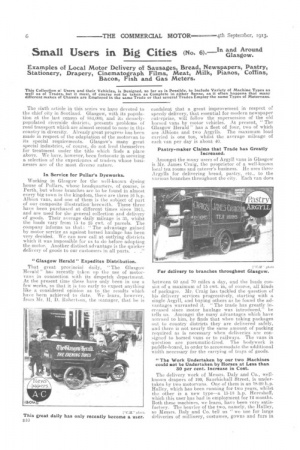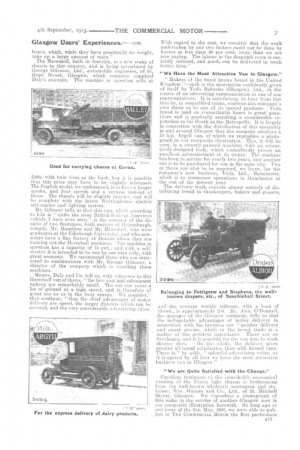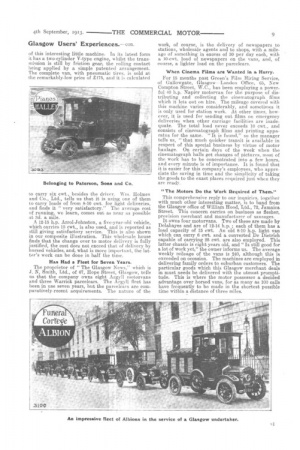Small Users in Big Cities (No. 6). _In and Around
Page 6

Page 7

Page 9

If you've noticed an error in this article please click here to report it so we can fix it.
Glasgow.
Examples of Local Motor Delivery th Sausages, Bread, Newspapers, Pastry, Stationery, Drapery, Cinematograph Films, Meat, Milk, Pianos, Coffins, Bacon, Fish and Gas Meters.
This Collection oi Users and their Vehicles, is Designed, so far as is Possible, to Include Variety of Machine Types as well as of Trades but it must, of course not be taken as Complete in either Sense, as it olten happens that many different makes of Chassis are Employed in the same Trade or that several Trades Employ the same Types of Motorvans.
The sixth article in this series we have devoted to the chief city in Scotland. Glasgow, with its population at the last census of 884,000, and its denselypopulated riverside districts„ presents problems of road transport which are almost second to none in this country in diversity. Already great progress has bee!1 made in respect of the adaptation of the motorvan to its special requirements. Glasgow's many great special industries, of course, do not lend themselves for treatment under the title which finds a place above. We have, however, been fortunate in securing a selection of the experiences or traders whose businesses arc of the most diverse nature.
In Service for Pullar's Dyeworks.
Working in Glasgow for the well-known dyeing house of Puliars, whose headquarte.rs, of course, is Perth, but whose branches arc to be found in almost every big town in the kingdom, there are three 10 h.p. Albion vans, and one of them is the subject of part of our composite illustration" herewith, These three have been purchased at different times Since .1911, and are used for the general collection and delivery of goods. Their average daily mileage is :35, whilst the loads vary from 15 to 25 cwt.. of parcels. The company informs us that: "The advantage gained by motor service as against horsed haulage has been very decided. We can now call at outlying districts which it was impossible for us to do before adopting the motor. Another distinct advantage is the. quicker delivery of goods to our customers in all parts. . ."
" Glasgow Herald •• Expedites Distribution.
That great provincial daily, "The Glasgow Herald' has recently taken up the use of motorvans in connection with its despatch department. At the present time these have only been in use a few weeks, so that it is too early to expect anything like a considered opinion as to the results which have been achieved to date. We learn, however, from Mr. H. D. Robertson, the manager, that he is confident that a great improvement in respect oF speedy delivery, that essential for modern newspaper enterprise, will follow the supersession of the old horsed vans by motor vehicles. At present, " The Glasgow Herald" has a fleet of four, two of which are Albions and two Argylls. The maximum load carried is one ton, whilst the average mileage of each van per day is about 40.
Pastry-maker Claims that Trade has Greatly Increased.
Amongst the many users of Argyll vans in Glasgow is Mr. James Craig, the proprietor of a well-known local tea rooms and caterer's business. He uses three Argylls for delivering bread, pastry, etc., to the various branches throughout. the city. Each van does between 60 and 70 miles a day, and the loads consist of a maximum of 15 cwt.. in, of course, all kinds of packages. Mr. Craig has tackled the question of his delivery services progressively, starting with a single Argyll, and buying others as he found the advantages warranted it. " The trade has greatly increased since motor haulage. was introduced," he tells us. Amongst the many advantages which have accrued to him, he finds that when taking packages out to country districts they are delivered safely, and there is not nearly the same amount of packing required as is necessary when deliveries are consigned to horsed vans or to railways. The vans in question are pneumatic-tired. The bodywork is paddle-boxed, in order to accommodate the additional width necessary for the carrying of trays of goods.
"The Work Undertaken by our two Machines could aot be Undertaken by Horses at Less than 50 per cent. Increase in Cost.
The delivery work of Messrs. Daly and Co., wellknown drapers of 199, Sauchieh.all Street, is undertaken by two motorvans. One of them is an 18-20 h.p. Halley, which has been running for two years, whilst the other is a new type—a 15-18 h.p. Hereshoff, which this user has had in employment for 12 months. Both these machines, we learn, have been very satisfactory. The heavier of the two, namely, the Halley, so Messrs. Daly and Co. tell us " we use. for large deliveries of millinery, costumes, gowns and furs in
boxes, which, while they have practically no weight, take up a large amount of room."
The Hereshoff, built in America, is a new make of chassis to this country, and is being introduced by George Gilmour, Ltd., automobile engineers, of 91, Hope Street, Glasgow, which company supplied Daly's example. The machine in question sells at .g295, with twin tires at the back, but it is possible that this price may have to be slightly increased. The English model, we understand, is to have a longer stroke, and four speeds and a reverse instead of three. The chassis will be slightly heavier, and will be complete with the latest Westinghouse electric self-starter and lighting system. Mn Gilmour tells us that this van, which according to him is " quite the most British-look iag American vehicle I have ever seen," is the outcome of the designs of two Scotsmen, both natives of .Helensburgh, namely, Mr. Hamilton and Mr. Hereshorl, who were graduates at the Edinburgh University, and who nowadays have a fine factory at Detroit where they are turning out the Hereshoff machines. The machine in question has a capacity of 15 cwt., and with a selfstarter it is intended to be run by one man only, with great economy. We recommend those who are interested to communicate with MI% George Gilmour' a director of the company which is handling the se machines.
Messrs. Daly and Co. tell us, with reference to this Hereshoff van of theirs. "the first cost and subsequent upkeep are remarkably small. The car can cover a lot of ground at a high speed, and is therefore of great use to us in the busy season. We consider," they continue, "that the chief advantages of motor delivery are speed, the larger districts which can be • covered, and the very considerable advertising value.
With regard to the cost, we consider that the work undertaken by our two motors could not be done by horses at less than 30 per cent, more than we are now paying. The labour in the despatch room is certainly reduced, and goods can be delivered in much better time."
"We Have the Most Attractive Van in Glasgow."
"Makers of the finest brown bread in the United Kingdom "—such is the description confidently given of itself by Veda :Bakeries (Glasgow); Ltd., in the course of an interesting communication to one of our representatives. It is Satisfactory to hear from him that 'he, in unqualified terms, confirms this company's own claim as to one of its special products. Veda bread is used on transatlantic liners in great' quantities and is gradually acquiring a considerable reputation so far South as the Metropolis. It is largely in connection with the distribution of this speciality in and around Glasgow that the company employs a 15 ki.p. Argyll van, of which we reproduce a photograph in our composite illustration. This, it will be seen, is a smartly-painted machine, with an attractively-designed body, which undoubtedly proves an excellent advertisement to its owner. The machine has been in service for nearly two years, and another one is to be purchased for use in the same city. Two or three are also to be acquired, we learn, for the company's new business, Veda, Ltd., Manchester, which is to commence operations in Manchester at the end of the present year.
The delivery work consists almost entirely of distributing bread to shopkeepers, bakers and grocers,
and the average weekly mileage, with a load of 10 cwt., is approximately 2C0. Mr. Alex. O'Donnell, the manager of the Glasgow company, tells us that the indisputable advantages of motor delivery in connection with his business are " quicker delivery and smart service, which in the bread trade is a matter of the greatest importance. There arc no breakages, and it is possible for the van men to work
shorter days. On the whole, the delivery gives greater all round satisfaction than with horsed vans. There is," he adds, splendid advertising value, as it is agreed by all that we have the most attractive business van in Glasgow."
"We are Quite Satisfied with the Change."
Excellent testimony to the remarkable economical running of the Forest light chassis is forthcoming from the well-known wholesale newsagent and stationer, WM. Holmes and Co., Ltd., of 26, Mitchell Street, Glasgow. We reproduce a photograph of this make in the service of another Glasgow user in our composite illustration herewith. So long ago as our issue of the 21st May, 1908, we were able to.pub. lish in TRH COMMERCIAL MOTOR the first particulars B13 of this interesting little machine. In its latest form it has a two-cylinder V-type engine, whilst the transmission. is still by friction gear, the rolling contact being applied by a simple patented arrangement. The complete van, with pneumatic tires, is sold at the remarkably-low price of 2175, and it is calculated to carry six cwt., besides the driver. Wni. Holmes and Co., Ltd., tells us that it is using one of them to carry loads of from 8-10 cwt. for light deliveries, and finds it " very satisfactory." The average cost of running, we learn, comes out as near as possible at 3d. a mile.
A 12-15 h.p. Arrol-Johnston, a five-year-old vehicle, which carries 15 cwt., is also used, and is reported as still giving satisfactory service. This is also shown in our composite illustration. This wholesale house finds that the change over to motor delivery is fully justified, the cost does not exceed that of delivery by horsed vehicles, and, what is more important, the latter's work can be done in half the time.
Has Had a Fleet for Seven Years.
The proprietor of "The Glasgow News," which is J. N. Smith, Ltd., of 67, Hope Street, Glasgow, tells us that the company owns eight Argyll reotorvans and three Warrick parcelcars. The Argyll fleet has been in use seven years, but the parcelcars are comparatively-recent acquirements. The nature of the work, of course, is the delivery of newspapers to stations, wholesale agents and to shops, with a. mileage of something in excess of 30 per day each, with a 10-ewt. load of newspapers on the vans, and, of course, a lighter load on the parcelcars.
When Cinema Films-are Wanted in a Hurry.
For 15 months past Green's Film Hiring Service, of Gallowgate, Glasgow—London Office, 65, New Compton Street, W.C., has been employing a powerful 40 h.p. Napier motorvan for the purpose of distributing and collecting the cinematograph films which it lets out on hire. The mileage covered with this machine varies considerably, and sometimes it is only used for station work. At other times, however, it is used for sending out films on emergency deliveries when other carriage facilities are inadequate. The total load never exceeds 10 cwt., and consists of cinematograph films and printing apparatus for the same. 'It is found," so the manager tells us, "that much quicker transit is available in respect of this special business by virtue of motor haulage. On certain days of the week when the cinematograph halls get changes of pictures, most of the work has to be concentrated into a, few hours, and every minute is of importance. It is found that it is easier for this company's employees, who appreciate the saving in time and the simplicity of taking the goods to the exact places required just when they are ready.
"The Motors Do the Work Required of Them."
This comprehensive reply to our inquiries, together with much other interesting matter, is to hand from the Glasgow office of William Hood, Ltd., 72, Jamaica Street. This concern carries on business as flesher, provision merchant and manufacturer of sausages. It owns four motorvans. Two of these are made by Delahayes and are of 12-14 h.p. ; each of them has a load capacity of 15 cwt. An old 8-10 h.p. light van which can carry 6 cwt. and a converted De Dietrich capable of carrying 25 cwt. are also employed. This latter chassis is eight years old, and "Is still good for a lot of work yet," the owner informs us. The average weekly mileage of the vans is 240, although this is exceeded on occasion. The machines are employed in delivering family orders to suburban customers. The particular goods which this Glasgow merchant deals in must needs be delivered with the utmost promptitude. This is where the motor possesses a decided advantage over horsed vans, for as many as 100 calls have frequently to be made in the shortest possible time within a. distance of three miles.


















































